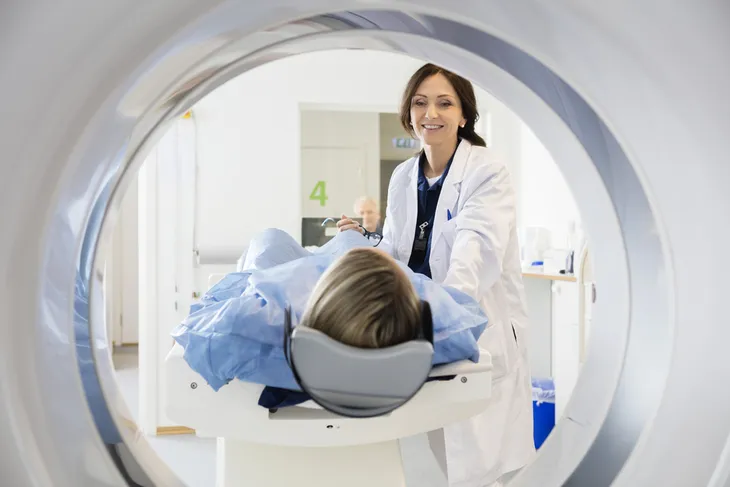- Superior mesenteric artery (SMA) syndrome is a rare digestive disease.
- Left untreated, it can lead to disabling symptoms, and in some cases, it can even be fatal.
- Know the signs of SMA syndrome and contact your doctor right away if they develop.
Superior mesenteric artery (SMA) syndrome is a rare disease that affects the digestive system. Though it is rare, it can be fatal if left untreated. So it’s important to know the warning signs and seek medical treatment right away if you think you may have it.
Unfortunately, symptoms of SMA can be nonspecific, meaning they can be signs of many other conditions. This can make a diagnosis difficult but it’s not impossible. Here’s what you need to know about SMA syndrome, including what it is, the possible symptoms, how it’s diagnosed, and the treatment options.
What Is Superior Mesenteric Artery (SMA) Syndrome?
Superior mesenteric artery (SMA) syndrome is a rare digestive disease. According to WebMD, this disease affects the duodenum, which is the section of the small intestine that joins the stomach.
SMA syndrome occurs when the abdominal aorta and superior mesenteric artery (SMA) pinch the duodenum, which can prevent the movement of food through the small intestine. The source says that this can result in bowel obstruction and other abdominal symptoms.
Other Names for SMA Syndrome
Healthline points out that superior mesenteric artery syndrome has been referred to by many other names, so it may be helpful to know what they are. The source says the following are other possible names for SMA syndrome:
- Wilkie’s syndrome
- Cast syndrome
- Chronic duodenal ileus
- Arterio-mesenteric duodenal compression syndrome
- Mesenteric root syndrome
- Benign duodenal stasis
Signs and Symptoms of Superior Mesenteric Artery Syndrome
Symptoms can vary from person to person and they’re often nonspecific, which can sometimes make a diagnosis difficult. However, Healthline says you should be on the lookout for these possible warning signs:
- Nausea
- Vomiting (especially with food that is partially digested)
- Feeling full quickly
- Weight loss
- Swollen belly
- Epigastric pain (pain below the ribs in the abdomen)
It’s also worth noting that symptoms can develop gradually for some people and rapidly for others.
What Causes Superior Mesenteric Artery Syndrome?
The National Organization for Rare Disorders (NORD) explains that SMA syndrome develops when “the duodenum is compressed by the SMA [superior mesenteric artery] against the AA [abdominal aorta] to cause blockage and prevent progression of food or fluids into the rest of the small intestine.” But what causes this phenomenon to occur?
SMA syndrome is often caused by another health complication but Healthline says it’s usually associated with significant weight loss. Normal weight loss from a diet or workout program isn’t usually a cause for concern but weight loss from anorexia nervosa, malabsorption syndrome, hypermetabolism, or cachexia may lead to SMA syndrome. The source also notes that in younger individuals, it may be caused by spinal surgery to treat scoliosis.
Who’s At Risk?
SMA syndrome is a rare disease that affects roughly 0.13-to 0.3-percent of the population in the United States. WebMD points out that teens and young adults are the most affected by it. That said, the disease can occur at any age. Additionally, the source also notes that it typically occurs in women more than men.
Healthline says there is no evidence that indicates race or ethnicity can increase your risk and it’s not considered an inherited disease either. But the source says you may have an increased risk if you’re born with “slight physical differences,” such as differences in the length of a ligament that supports the duodenum or the angle and location of where the SMA branches from the AA. However, the source says, you likely won’t know about these differences until after you’re diagnosed.
When to See a Doctor
Since SMA syndrome is a rare disease and the symptoms are often nonspecific, it can make a diagnosis difficult. But without proper treatment, symptoms can be disabling and the disease can even be fatal. So it’s important to always get checked by a doctor.
Unexplained weight loss can be a warning sign of the disease as well as other serious conditions, so you should always seek medical attention if it happens to you. You should also see a doctor if you’re experiencing weight loss with vomiting or abdominal pain. Early intervention is key!
 Dragana Gordic / Shutterstock
Dragana Gordic / ShutterstockDiagnosing Superior Mesenteric Artery Syndrome
To diagnose SMA syndrome, your doctor will likely begin by reviewing your medical history and symptoms, as well as a physical exam. Additional testing may be necessary to help rule out other health conditions that share similar symptoms.
WebMD says your doctor may use the following tests to confirm a diagnosis:
- Ultrasound uses sound waves to monitor how blood is flowing in your blood vessels.
- Computed tomography (CT) scan can look for a bowel obstruction.
- Abdominal X-ray can look for bloating and distension.
- Hypotonic duodenography may be necessary to take special images of the duodenum.
- An upper endoscopy can inspect the small intestine, stomach, and esophagus by inserting a tube with a camera down the throat.
Possible Complications
Diagnosing SMA syndrome can be difficult and sometimes it may take a while. Unfortunately, a delay in diagnosing and treating the disease may lead to severe complications. One possible complication is nutcracker syndrome, which develops when the same pinch point that causes SMA syndrome compresses the renal vein. Healthline says it’s not common to have both diseases at the same time but it can happen.
The source also says other possible complications include:
- Low blood pressure
- Low potassium
- Malnutrition
- Dehydration
- Peptic and duodenal ulcers
- Gastritis
- Decreased urine
- Bile reflux
- Aspiration pneumonia
How Is Superior Mesenteric Artery Syndrome Treated?
Treating SMA syndrome as soon as possible is vital. Left untreated it can be life-threatening. The goal of treatment is to resolve the underlying cause.
Healthline explains that doctors will first take a noninvasive approach to restore “the mesenteric fat pad to relieve pressure on your duodenum.” This can be done through controlled weight gain through a variety of methods, which we’ll explain next.
Treatment: Controlled Weight Gain
According to Healthline, if you’re severely malnourished, your doctor may recommend intravenous (IV) fluids or a feeding tube to help you gain weight. The source says, once it’s safe, your doctor will transition you to oral liquid nourishment, and then eventually you’ll start eating soft foods and then finally solids.
Once you start eating foods, your doctor will likely recommend very small meals at a time. You may also be prescribed medication to help prevent vomiting. The ultimate goal is to help you gain weight and boost the mesenteric fat pad.
Treatment: Surgery
If other treatment strategies fail to resolve the disease then surgery may be recommended. According to WebMD, there are three possible surgical procedures, including laparoscopic duodenojejunostomy, gastrojejunostomy, or transabdominal duodenojejunostomy.
Laparoscopic duodenojejunostomy may be the most preferred method as it has the lowest risk for complications. The source also notes that a duodenojejunostomy has an 80- to 100-percent success rate and the least postoperative pain. Other benefits to this procedure include a low risk of incisional herniation and your hospital stay may not be very long.
What Is the Outlook?
The outlook for SMA syndrome greatly depends on how quickly the disease is diagnosed and treated. Healthline says that early detection and treatment provide a much better outcome. Noninvasive treatments may take 4- to 6-weeks and you may also need follow-up care after the initial treatment.
In contrast, when the disease goes undetected it can progress and result in a much worse outcome. The source says intervention will be more severe and in some cases, it can even be fatal. This is why it’s important to be informed and know the signs. Book an appointment with your doctor right away if you develop symptoms of SMA syndrome.














